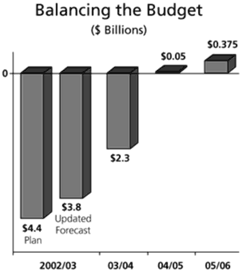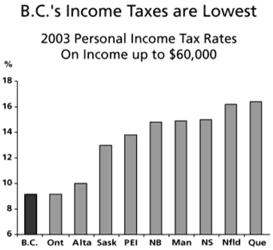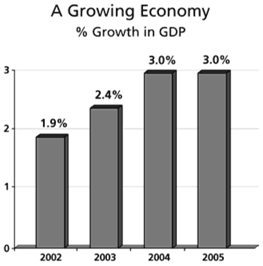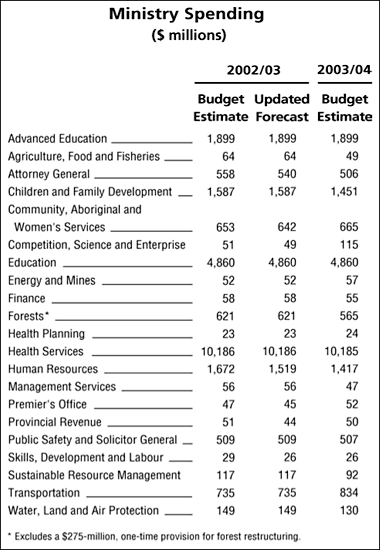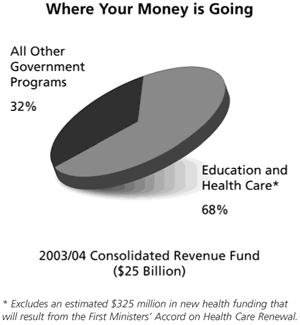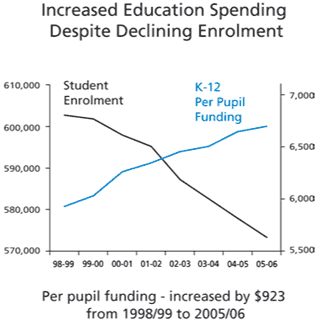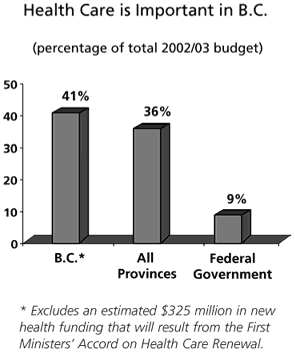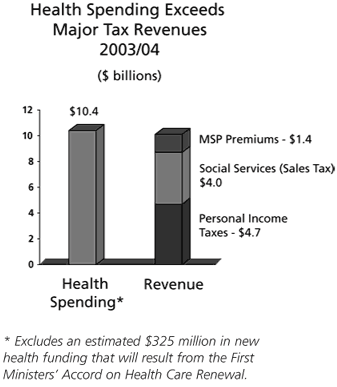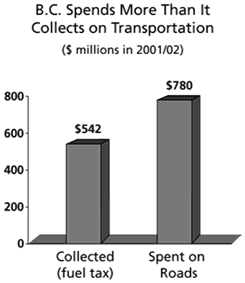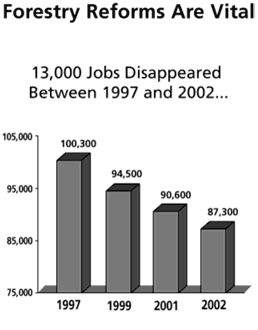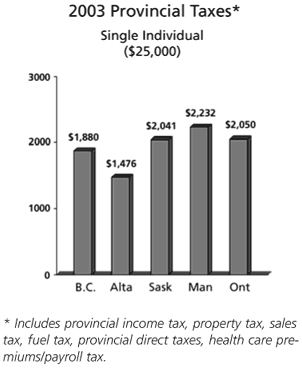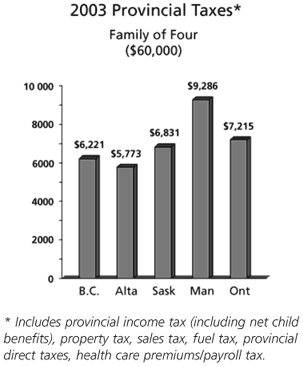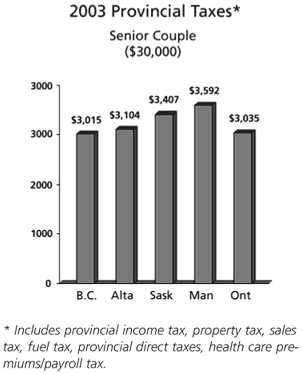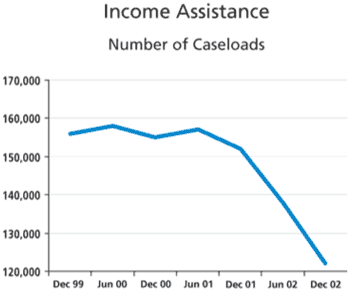 |
|
On Track For A Balanced BudgetWith its first full budget in February 2002, the provincial government introduced a three-year plan with three goals: to restore sound fiscal management, revitalize the economy and put patients, students and people in need first. The plan is working. In 2002-03, every government ministry is forecast to be within its budget. The deficit for the year is expected to be $600 million lower than originally planned. The economy has grown at almost three times the rate anticipated by independent forecasters. During 2002, the province created almost 78,000 jobs while enjoying booming residential construction and housing sales. And administrative and other efficiencies have meant more dollars for patient care and student achievement. As a result of improved economic growth and strong fiscal management, the government is on track to:
Strong Fiscal ManagementIn 2002/03, every government ministry will be within its operating budget, due to reductions in debt servicing, administration and other costs. Within ministries, $112 million in savings have been reallocated to meet priority needs that benefit patients, students and people in need. Responsible debt management is a key government priority. The 2002/03 budget forecast $920 million for debt-service costs — money needed to manage the public debt — but the 2002 third quarter forecast shows that debt-service costs are almost $200 milllion lower than anticipated. Taken together, government's prudent fiscal management and lower debt-service costs have freed up almost $400 million in total program savings. Some of that funding is being used to help our forest sector make the transition to a sustainable future.
More Resources for StudentsTogether with health care, education is our government's top priority. That's why, even as enrolments decline, we will maintain the $4.8-billion education budget and increase it by $143 million over the next three years. This will ensure more money is in the system for every student. The government will also provide a total of $85 million in one-time funding for education, advanced education and early childhood development in 2002-03. This will include $50 million for school districts to meet local priorities of the students they serve. This is in addition to a similar one-time grant of $42 million that was provided last year. Post-secondary students are benefiting, too. In the past 20 months, we have committed almost $900 million to advanced education and research projects, including:
Investing in Patient CareAs part of our government's commitment to put patients first, we increased health spending in 2002-03 by 12 per cent — $1.1 billion — to $10.4 billion. We've also embarked on a wide-ranging plan of renewal, to better manage resources, increase efficiency and ensure every dollar goes to meet patients' needs. As a result of those changes:
The changes announced in Budget 2003 — plus every dollar of the expected $1.3 billion in new, three-year federal health funding — will further modernize public health care, moving us towards a sustainable, patient-centred system for future generations.
Opening up the HeartlandsA modern, effective transportation system is key to revitalizing our economy. That's why our government has launched a three-year transportation plan. The government will commit $650 million and expects to leverage another $1.7 billion from the federal government and other partners. This program will allow for improvement to our highways, bridges, ports and other infrastructure. Long-term priorities include much-needed safety improvements to the Kicking Horse Canyon and the Sea-to-Sky Highway. Other priorities include building a new Okanagan Lake Bridge at Kelowna, retaining the toll-free inland ferry system, expanding Cranbrook Airport to open up the Kootenays and containerizing the port in Prince Rupert. Budget 2003 will support:
Every penny of the 3.5-cent-per-litre increase in provincial fuel tax will be dedicated to supporting the transportation plan.
Revitalizing Our Forest IndustryForestry is B.C.'s number-one industry — and the government is committed to revitalizing it and offering new hope to forest companies, workers and communities. Reforms introduced to date include the new results-based Forest and Range Practices Act; investment in international marketing, product development and research; and a proposal to designate a portion of B.C.'s land base as working forest. Changes in the year ahead will include tenure policy reform and moving to market-based timber pricing. Budget 2003 will support these significant changes in B.C.'s approach to forestry, with:
Strengthening Our EconomyGovernmentís new B.C. Heartlands Economic Strategy will open up new opportunities for economic growth throughout the province. B.C. needs competitive taxes and sensible regulation to attract and retain investors, companies and skilled workers — the building blocks of a strong economy, and the generators of government revenues necessary to sustain health care, education and other services. Building on the government's commitment to maintain a competitive tax system, Budget 2003:
These targeted tax changes will be worth $29 million annually by 2004-05. Since June 2001, the government has provided 27 tax-relief measures with a net benefit of about $900 million to individual British Columbians and more than $350 million to businesses.
Strengthening Our EconomySector-specific tax changes in Budget 2003 — combined with the impact of dramatic personal and business tax cuts since June 2001 — will position B.C. for further improvement in its investment climate. The provinceís economy is expected to grow by 2.4 per cent in 2003 — increasing to three per cent in 2004 and 2005.
Meeting Family and Community NeedsAs B.C. sticks to its plan, revenues grow and sound fiscal management is restored, the government will be able to devote affordable, sustainable funding increases to priority services for British Columbians. This year, the government will continue to assist community organizations, by maintaining charity top-up grants over the next three years. Further consultations will be held to find a fair and equitable approach to policing rural areas and communities with fewer than 5,000 residents. Budget 2003 will also provide:
On track for:
For complete details of what Budget 2003 and the three-year fiscal plan mean to you, visit: www.bcbudget.gov.bc.ca/2003
|
||||||||||||||||||||||||||||||||||||||||||||||||
